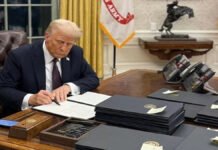Tariff War: After Canada, Mexico, and China, Is Europe Next? Trump’s Statement Sparks Global Concerns
The Escalating Trade Conflict and Its Global Implications
The global economy faces rising uncertainty as U.S. President Donald Trump escalates trade tensions, now setting his sights on Europe. After imposing tariffs on Canada, Mexico, and China, Trump has declared that the European Union (EU) has “taken advantage” of the United States for too long. His recent remarks have sent shockwaves across international markets, raising fears of a full-scale tariff war with serious consequences for global trade.
Trump’s Justification: The EU’s Trade Surplus with the U.S.
Trump has repeatedly criticized the European Union’s trade practices, pointing out that the EU enjoys a significant trade surplus with the United States. He has suggested that the U.S. has been at a disadvantage, claiming that European tariffs and regulations have unfairly restricted American exports while allowing European goods easy access to U.S. markets. Although Trump has not set a timeline for these tariffs, he has assured that a decision will come “soon.”
Europe’s Response: A Warning of Retaliation
The European Union has swiftly responded, warning that any new U.S. tariffs would be met with strong countermeasures. A spokesperson for the EU stated that if the United States proceeds with unilateral tariffs, the European Union will not hesitate to impose retaliatory tariffs on American goods. European leaders have also voiced concerns over the impact of trade protectionism, emphasizing that such moves could harm economic growth, investment, and employment on both sides of the Atlantic.
Impact on Major Industries and Global Trade
A trade war between the U.S. and the EU would have far-reaching implications for several industries, including automobiles, agriculture, steel, and technology. Let’s take a closer look at the sectors that could be most affected:
1. Automotive Industry: A Potential Trade War Battleground
One of the primary targets of Trump’s tariff plans is the European automotive sector. German automakers like BMW, Volkswagen, and Mercedes-Benz have significant operations in the United States. If the U.S. imposes heavy tariffs on European car imports, it could lead to higher consumer prices and job losses in both regions. The EU has warned that it would counteract with tariffs on American cars, intensifying the dispute.
2. Agriculture: Farmers at Risk
The agricultural sector could also become a casualty of escalating tariffs. The EU is a major market for American agricultural exports, including soybeans, corn, and meat products. If Europe retaliates with tariffs on these goods, U.S. farmers could face severe financial losses, especially since they are already struggling due to ongoing trade disputes with China.
3. Steel and Aluminum: Reigniting Trade Tensions
Trump had previously imposed steel and aluminum tariffs on the EU, leading to countermeasures on American bourbon, motorcycles, and dairy products. A fresh round of tariffs on European metals could further destabilize global supply chains, leading to increased production costs and inflation.
4. Technology: A Threat to Transatlantic Innovation
Europe is home to major technology firms, and a tariff war could disrupt collaborations between American and European tech giants. This could hinder cross-border investments, research collaborations, and supply chains, affecting companies like Apple, Google, and SAP.
Trump’s Trade War Strategy: A Global Pattern
Trump’s latest threat against Europe follows his ongoing trade battles with other nations:
- Canada & Mexico: Trump imposed 25% tariffs on Canadian and Mexican products, prompting retaliation from both nations.
- China: The U.S. imposed an additional 10% tariff on Chinese goods, escalating tensions between the world’s two largest economies.
- India: Trump has accused India of imposing “high tariffs” on American products, hinting at potential actions against Indian exports.
South Africa: Trump has also raised concerns about property rights issues in South Africa, threatening to cut financial aid to the country.
















